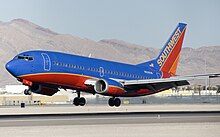Fleet commonality
Appearance
This article provides insufficient context for those unfamiliar with the subject. (March 2010) |

Aviation commonality describes the economic and logistic benefits of operating a standardized fleet of aircraft that share common parts, training requirements, or other characteristics.
Commonality lowers the cost of operating a fleet of aircraft by reducing the quantity and variety of spare parts needed. Pilots and mechanics may also be very quickly "familiarized" to multiple types of aircraft that share common operating and maintenance procedures, reducing downtime.
Commonality policies may be defined in a variety of ways, depending on the operator:
- for civilian aircraft:
- for military aircraft, the same can be said:
